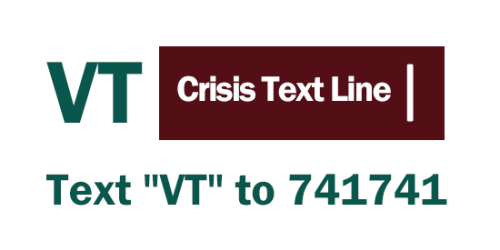What is Trauma?
Trauma is a widespread, harmful and costly public health problem. It occurs as a result of violence, abuse, neglect, loss, disaster, war and other emotionally harmful experiences. Trauma has no boundaries with regard to age, gender, socioeconomic status, race, ethnicity, geography or sexual orientation. diseases. It is an almost universal experience of people with mental and substance use disorders. The need to address trauma is increasingly viewed as an important component of effective human services delivery.
Individual trauma results from an event or series of events or set of circumstances that is experienced by an individual as physically or emotionally harmful or life-threatening and that has lasting adverse effects on the individuals functioning and mental, physical, social, emotional or spiritual well-being. (see “SAMHSA’s Concept of Trauma and Guidance for a Trauma-Informed Approach”, www.samsha.gov, 2014)
The Agency of Human Services is committed to being a trauma-informed and trauma-responsive organization. We work to foster a human services system that employs and practices trauma-informed principles in relation to staff and the individuals and families we serve.
Racial Trauma
As we waken to and reckon with the effects of systemic racism, it seems timely to offer some words, resources, and tools to expand our collective understanding about racial trauma. The intention of this list twofold: to raise our collective awareness about the experience of racial trauma and to provide some understanding of the intersection between traumatic stress and racism. It is hoped that you will continue to add your own resources to this as well. Note: the list below is specific to racial trauma (not racism more broadly) and is by no means exhaustive.
As stated in our Trauma Informed System of Care Policy, The Agency of Human Services is committed to being a trauma-informed and trauma-responsive organization (33 V.S.A. § 3401). This means AHS continuously works to: realize the widespread impact of trauma and toxic stress and understand potential paths for recovery; recognize the signs and symptoms of trauma; respond in our policies, procedures, and practices; and actively resist re-traumatizing others.
RACIAL TRAUMA (also known as race-based traumatic stress) refers to the stressful impact or emotional pain of one’s experience with racism and discrimination. Traumatic events that occur as a result of experiencing or witnessing racist events, discrimination, or enduring the effects of systemic racism can have a profound and lasting impact on the physical and psychological health and well-being of individuals exposed to and targeted by those events.
ARTICLES:
- Self-Care Tips for Black People Who Are Struggling With This Very Painful Week, by Rachel Miller, May 28 2020
- Check in on Your Black Employees, Now, NY Times , Opinion, by Tonya Russell June 2, 2020
- When Dismantling Power Dismantles You Instead, by Marie Solis
- Systems of Trauma/Racial Trauma Issue Brief, Family and Children’s Trust Fund of Virginia
- Racism’s Psychological Toll, NY Times Interview of Monnica Williams, a psychologist, professor and the director of the University of Louisville’s Center for Mental Health Disparities. June 2015.
- Racial Trauma: Theory, Research, and Healing: Introduction to the Special Issue, Lillian Comas-Díaz , Gordon Nagayama Hall, Helen A. Neville, published in the January 2019 issue of American Psychologist.
BOOKS:
- My Grandmother's Hands: Racialized Trauma and the Pathway to Mending Our Hearts and Bodies by LICSW Resmaa Menakem, MSW
- Healing Racial Trauma: The Road to Resilience, by Sheila Wise Rowe, Jan 2020
RESOURCE PAGES:
- Surviving and Resisting Hate: A Toolkit for People of Color, #ICRaceLab, Dr. Hector Y. Adames & Dr. Nayeli Y. Chavez-Dueñas
- Resources from the Institute for the Study and Promotion of Race and Culture, Boston College
- Racial Trauma Resources from UC Davis
- Anti-Racism as Violence Prevention, Resources from Futures Without Violence website
More Information & Resources
For more information, or to learn more about trauma or resilience, see below:
Websites and Webpages
- Center on the Developing Child: Harvard University
- ACEs Connection: prevent adverse childhood experiences, heal trauma and build resiliency
- ACEs Too High
- SAMSHA: Substance Abuse and Mental Health Services Administration
- Resilience and Healing: Jane Doe Initiative for Safety and Justice
- Resilience Research Institute – Dr. Michael Ungar et al
- The Child and Youth Resilience Measure (CYRM) Manual Dr. Michael Ungar
- Resilience Building Activities for Parents and Kids, Bounceback Parenting
- The Center for Health Care Strategies: Implementing Trauma-Informed Care into Organizational Culture and Practice (Ken Epstein & Robert Wood Johnson Foundation)
Videos
- How Toxic Stress Derails Healthy Development
- Dr. Ungar on Adult Resilience: Cinderella or Fairy Godmother?
- The Science of Resilience
- Building Core Capabilities for Life (Resilience Building)
- Elmo Belly Breathing Technique
Books about Trauma & Adversity
- Brainstorm: The Power and Purpose of the Teenage Brain, Siegel, Daniel, 2013, Penguin Group.
- The Body Keeps Score: Mind, Brain, and Body in the Transformation of Trauma; Van Der Kolk, Bessel, MD, 2014, Penguin Publishing.
- The Boy Who Was Raised As a Dog: And Other Stories from a Child Psychiatrist's Notebook - What Traumatized Children Can Teach Us About Loss, Love, and Healing; Perry, Bruce
- Deep Brain Learning: evidence-based essentials in education, treatment, and youth development: Brendtro Larry and Martin, Mitchell, 2015.
- Healing Developmental Trauma: How Early Trauma Affects Self-Regulation, Self-Image and the Capacity for Relationship; Heller, Laurence, PhD and Lapierre, Aline, PsyD, 2012, North Atlantic Books.
- The Deepest Well: Healing the Long Term Effects of Childhood Adversity; Burke Harris, Nadine MD, 2018, Mariner Books.
- Trauma-Sensitive Mindfulness: Practices for Safe and Transformative Healing; Treleaven, Davis A., 2018, WW Norton and Co., Inc.
Books about Resilience
- Bounce: Overcoming Adversity, Building Resilience, and Finding Joy; Gaisford, Cassandra. 2017, Blue Girraffe Publishing.
- Building Resilience in Children and Teens: Giving Kids Roots and Wings; Ginsburg, Kenneth MD, 2015 (3rd Edition), American Academy of Pediatrics.
- Building Resilience in Students Impacted by Adverse Childhood Experiences: A Whole-Staff Approach; Romero, Victoria E. et al, 2018, Corwin/Sage Publishing Co.
- Nurturing Resilience: Helping Clients Move Forward from Developmental Trauma, and Integrative Somatic Approach; Kain, Kathy L. and Terrell, Stephen J., 2018, Northa Atlantic Books.
- Reclaiming Youth at Risk: Our Hope for the Future; Bredtro, Larry K. et al, 2002, Solution Tree.
- Research Based Strategies to Ignite Student Learning; Willis, Judy, MD, 2006, Association for Supervision and Curriculum Development
Contact
If you would like more information about what AHS is doing to become a trauma informed system of care, please contact:
Kheya Ganguly, Director of Trauma Prevention and Resilience Development, at Kheya.Ganguly@vermont.gov







